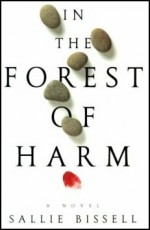
- “’Mary?’ Joan asked tentatively, an instant before she looked down and saw that the figure stood barefooted. Dark hair covered the tops of the feet; the nails were thick as claws. A snippet of bright green grass clung to one dirty toe. Joan opened her mouth to speak, but the foot moved. Fast, as if stomping a cockroach, it slammed down on her throat, crushing her vocal cords. When she next opened her mouth it was only to suck in air, to hang on to the slender thread that tethered her to this life.
“’You make one sound and I’ll sic my little friend on you.’”
Thus does a hiking trip turn terrifying in Sallie Bissell’s In the Forest of Harm.
Assistant District Attorney Mary Crow knows she has made some enemies in her career. Her talent for sending scumbags to jail hasn’t always made her popular, but when she and her two college friends, Joan and Alexandra, take a weekend trip to the mountains, she figures she’s left all the psychos in Atlanta.
Little do the women know what awaits them.
The mountains of North Carolina and Tennessee, in the Nanatahala National Forest, are as rugged as the Southern Appalachians come: steep, unpopulated, and treacherously beautiful. Mary, the daughter of an Indian mother and a white father, has grown up here, and her relationship with the land reflects the pain and pleasure in her life. However, she has not returned to her home turf since the time, 12 years before, when her mother was raped, tortured, and left to die in the tiny Little Jump Off store. Since then, Mary has devoted herself to putting people like her mother’s unknown murderer behind bars, earning with single-minded intensity the nickname “Killer Crow.”
But over a decade has passed, and Mary Crow is coming home.
This is supposed to be a fun weekend, despite her intention to visit her mother’s grave and the store where she died. Joan has never been camping or hiking, and neither she nor Alex has ever been to the Nantahala Forest, so Mary thinks this will be a great way to introduce them to life away from the noise and pollution of the city. However, when the rabid brother of a convicted felon follows the women to exact his revenge on the assistant D. A. who humiliated him on the stand, and when a schizophrenic recluse with a pet snake gets wind of the hikers’ presence, things start to unravel fast.
Despite the overly dramatic title, In the Forest of Harm is a stellar example of suspense fiction at its best. The writing is subtle and the vocabulary superb, enabling the reader to picture each scene in Technicolor detail. Sounds, smells, tastes, textures and thoughts meld for a holistic mental impression, and the shifts between characters’ narration never interrupt the flow of the story.
Bissell uses the literary equivalent of cross-cutting to keep her reader up-to-date with the swiftly moving events, devoting one chapter to Mary and her friends, the next to Mitchell Whitman, the vengeful brother; a third to Henry Brank, who makes fairy-tale trolls look cuddly; and so on. While other authors have used this technique with limited success, Bissell not only makes it seem effortless, but manages to blend the transitions so well that the reader is only peripherally aware of them.
Probably the best way one could describe In The Forest of Harm is to say that it is complete. Unlike many other writers who have embraced the security of serialized fiction, relying on quantity to make up for lapses in quality, Bissell neither sacrifices character development for the sake of a fast-moving plot nor overloads her story with unnecessary internal monologue in an attempt to be “deep.” Her writing is fresh and funny, highly suspenseful and beautifully written, with a masterful introduction to the characters who will undoubtedly people books to come.
The next Mary Crow adventure will be awaited with great anticipation, and it is only to be hoped that it will be worthy of the auspicious beginning chronicled here, In the Forest of Harm.






